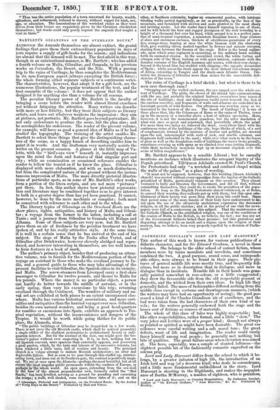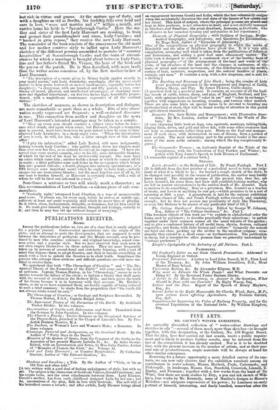CATHERINE SINCLAIR'S LORD AND LADY HARCOURT..
THE author of this work is known for various publications of a. didactic character, and for Sir Edward Graham, a novel in three volumes. She belongs to the older school of correct fiction, whose members were by turns moralists and novelists, and sometimes combined the two. A good purpose, sound sense, and unimpeach- able ethics, were always to be found in their pages. Their pic- tures of genteel middle life were mostly true, and frequently feli- citous, but more so in description than in dialogue, and more in dialogue than in incidents. Humble life in their hands was gene- rally painted somewhat in rose-colour, or a little exaggerated ; they drew the favourable side from the old respectable peasant or domestic, and the wicked from their own ideas. In high life they generally failed. The mass of fashionables differed nothing from the middle class except in costume and drawingroom manners, (which the writers may have had an opportunity of seeing) ; the good pos- sessed a kind of Sir Charles Grandison air of excellence, and the bad were taken from the bad characters of their own kind of no- vels ; for the writers generally eschewed both the stage and the looser sort of fictions as sources of materials.
The whole of this class of tales was highly respectable ; but, like other respectabilities, rather formal, and a little " slow." The very jokes and levities were of a proper kind ; though not always as pointed or spirited as might have been desirable. The great ex• cellences were careful writing and a safe moral tone ; the great defects, want of life and imagination. The reader could rarely fancy himself among real people ; he generally met nothing but bits of qualities. The great failure arose when elevation was aimed at. The hero, especially, was a sample of stunted loftiness—the slightest possible -bit of the fashionably romantic engrafted on the solemn prig.
Lord and Lady Harcourt differs from the school to which it be- longs, by a greater infusion of high life, the introduction of an Irish lord and wag (of a decorous kind) who deals in conundrums, and a little more fundamental unlikelihood in the story. Lord Harcourt is shooting in the Highlands, and makes the acquaint- ance of Bertha M'Murray, a maiden of eighteen, who is penniless,
• Lord and Lady Harcourt; or Country Hospitalities. By Catherine Sinclair, Author of " Sir Edward Graham," " Jane Bouverle," &e. &e. Published by Bentley. but rich in virtue and graces. At the mature age of 'forty, and with a daughter as old as Bertha his lordship falls over head and ears in love, "woos and marries and a'" within a, month, and carries home his bride to " Sa.xonborough Castle.° Here the mo- ther and sister of the first Lady]Inreourt are resioing, to train and protect their granddaughter and niece, Lady Carolinei and d in grim repose," they receive the new Lady Harcourt. The remainder of the book consists of the annoyances the old maid sita her mother contrive slyly to inflict upon Lady Harcourt; sketches of the different persons assembled to partake of "country hospitalities" at Saxonborough Castle; and the train of circum- stances by which a marriag i
e s brought 'about between Lady Caro-
line and her father's friend 2dt. rernon, the hero of the book and the parson of the parish. He is thus described, with more truth than the writer seems conscious of, by the first mother-in-law of
Lord Harcourt.
" The description of a curate given by Sidney Smith applies exactly to your model parson,' said Lady Axminster, sneeringly, (for she never could endure to hear praise bestowed on men of small income, especially before her daughter) ; a clergyman with one hundred and fifty pounds a year, com- bining all moral, physical, and intellectual advantages; of charming man- acle and dignified deportment ; six feet two inches high, beautifully propor- tioned, with a magnificent countenance expressive of all the cardinal virtues.' " The sketches of manners, as shown in description and dialogue, are more remarkable as parts than as a whole. Bits of nice obser- vation neatly expressed are frequent; a well-sustained discourse is rare. This emanation from mother and daughter on the news of Lord Harcourt's intended marriage may be taken as a sample. "'They say every man should consider a subject twice before he acts— once when drunk, and again when sober; but Harcourt, though a temperate man in general, must have been very far gone indeed before he came to this,' observed Lady Axminster in a sharp angry voice. When the intoxication of love is over, he will, eao late, take a sober enough view of this absurd affair.'
"'I pity his infatuation added Lady Rachel, still more indignantly, looking towards Lady Caroline ; who quietly shook down her ringlets more than ever over her face, so as entirelyto conceal its expression. 'I have ob- served that every mortal commits, once in his life, some intolerable blunder, ad which for the rest of his days he irretrievably repents. One man buys an estate which ruins him ; another builds a house in which he cannot afford to reside; a third publishes some rash letter in the newspapers which brings him into general ridicule ; a fourth plunges into unlucky speculations; or a fifth betrays some important secret which he ought to have kept,—nobody escapes his one tremendous blunder; but the most hopeless case of all is, for any man to burden himself; as Harcourt is certainly doing, with a wife of whom he will be tired and ashamed in a week.' " Sometimes a sentence or two will nicely mark a character ; as this recommendation of Lord Charlton—a solemn piece of safe com- monplace.
"'Perfectly right,' interposed Lord Charlton, in a tone of unanswerable goodsense. I always say, let every man, before he arrives at middle age, cultivate at least one game requiring skill which he never tires of playing. Be it whist, chess, backgammon, draughts, or dominoes, but let him excel in it. He must give himself, body and mind, thought and feelings, entirely to it; and then he may fare old age without danger of wearying.'

























 Previous page
Previous page